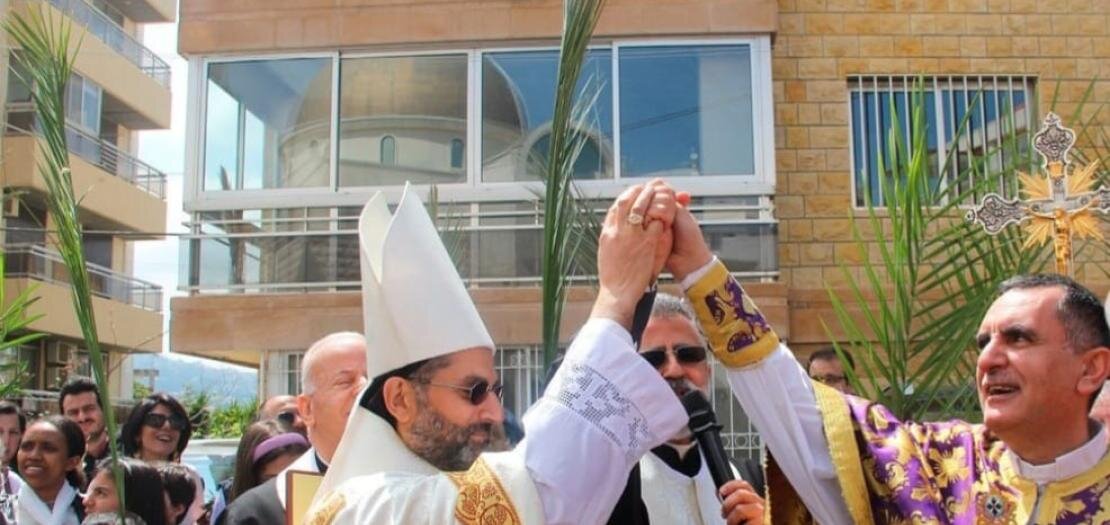Inequalities and hidden poverty are growing in Lebanon. Just days before the Feast of Easter, deprivation is keenly felt in some pockets of the population, who lack access to goods. “Easter is sharing! God sharing his life with us, and us with others!” assures Fr. Elie Sfeir, curate of the Maronite Parish of the Resurrection. Located in a relatively affluent region of the country, the aid of about 100 euros that the parish allocates each month ends up making a difference for about 30 families in need.
“It is comforting to see that our churches are full. The crisis has awakened the consciences of many,” confirms one of his helpers. “However, stores and businesses are empty. In the clothing sector sales multiply!”
“I was told that the cashier of the Zara clothing chain in a large area of the region had to intervene to control the crowds” on the eve of the Palm Sunday Festivals, Fr. Elie explains. IHe adds, “these shoppers are part of expatriate families in Dubai or Abu Dhabi!” He takes the opportunity to point out that 130 families from his parish have left the country, in the past two years, most of them heading to the Gulf.
“In any case, there are no more rich people in Lebanon,” he resumes. “Their money is stuck in the banks. Only the new rich remain here, paid in ‘cash dollars’ and the new poor, those who continue to receive their salaries in Lebanese lira, who are the vast majority.”
“The Lebanese, in general, try to hide their poverty,” explains Roland, a man in his 50s, an interpreter by profession, who divides his time between the Land of the Cedars and abroad. Many Lebanese are behind on their rents; this is one of the first signs of poverty. But the rich in this region are living in a bubble.”
“We have all curtailed our lifestyles,” adds his wife. “Chocolate, has disappeared from our party favors, along with other simple things that have become too expensive, such as colored eggs, invitations with friends, outings, and the traditional ‘maamouls’ [almond-filled galettes], which have always marked the holiday. We try to avoid waste!”
Mireille and Khawla, two sisters in charge of an NGO that distributes medicine and food to the poorest called “Towards the Traditional East,” confirm the sudden impoverishment of a middle class that has seen its savings frozen by banks, in 2019, and its income melt away like snow in the sun at this late stage.
“The help this association brings is varied,” explain these mothers of families, who receive contributions from Lyon, where one of their brothers lives, and from a Christian association in Germany. “It all depends on what we receive, although it is usually medicine.” The two sisters just helped a retired couple reduced to poverty. The man is sick with cancer. “To live and take care of himself,” they recount, “the couple gradually sold everything, including their car and the few pieces of jewelry they had left. But, after several months of unpaid rent arrears, they also ended up on the street,” adds one of the two. Taken into a convent, they now live on handouts.
The two leaders complain about the drying up of international aid. “Now everything goes to Ukraine and to earthquake-stricken Turkey,” explains one of them. “They tell us,” Mireille counters, “you Lebanese are enterprising. Many of you are very rich. We are victims of our own reputation.”
In Zahlé, a Greek Catholic metropolis in the Middle East, the Easter season generally sees huge traffic jams forming in the city center. This year, however, the streets and stores are generally empty. “At the school, we organized processions on Fridays and distributed candles for the Feast of Palms, so as not to embarrass those of the students whose parents could not afford other luxuries,” explains Nelly, once the community patriarch’s right-hand man.
Zahlé’s great specialty is the milk galette, renowned throughout the country. This year “orders have been reduced by at least 60 percent,” says Maurice Barrak, one of the managers of “Salon des Familles,” a chain of galette producers.
“All our basic products: flour, sugar, cream, clarified butter, vegetable fat, everything, is paid for in dollars” he points out, to explain the reasons for the crisis.
Added to all these challenges and deprivations, is one of a spiritual nature. Indeed, the Orthodox communities celebrate Easter, this year, a week after the Catholics with many wondering how much longer it will take for the dream of Lebanese Christians for the unification of the two festivals to become a reality?






